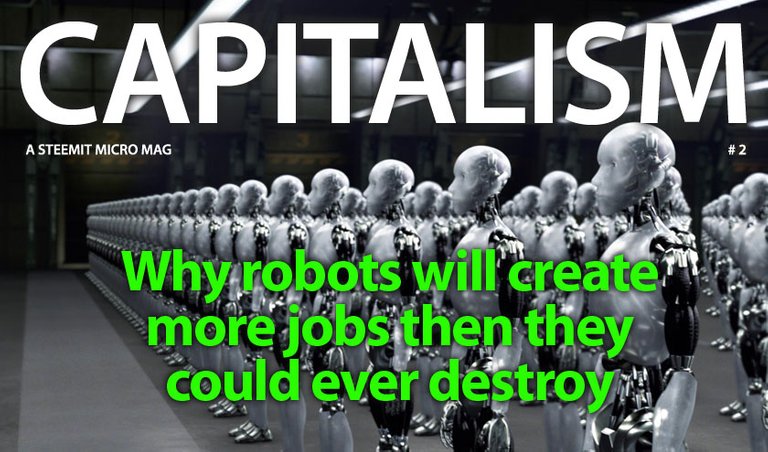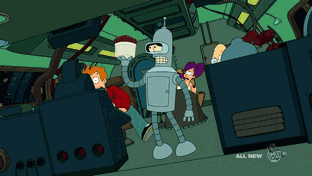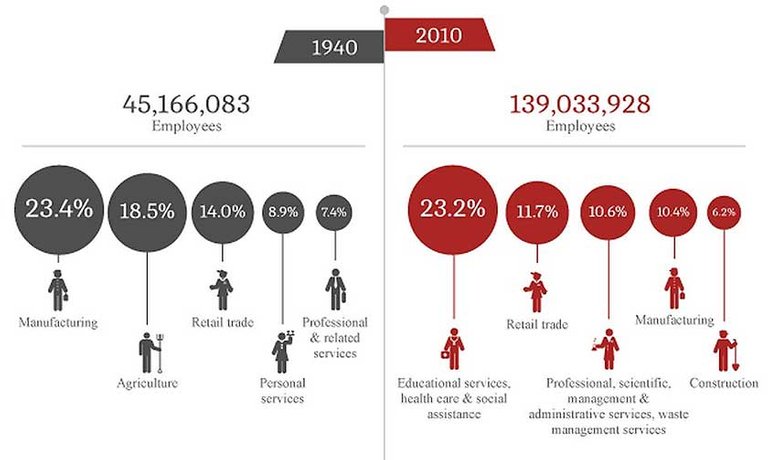
Yesterday @calaber24p published a very successful post on steemit, where he argued, that the coming mass automation movement will have the potential to start a class war. Some hours ago @kyriacosthe mass automation movement will make the world only better. A little bit later, @madaHomer Simpson analogy. With this post I want to bring my thoughts into this debate. published already a reply to @calaber, where he said, that on the other hand did support the view of @calaber24p with a nice
The fear of job stealing by machines is 200 years old
First I want to remind the reader, that the fear of machines that stealing jobs from humans is a least 200 years old. When the Cotton Gin was introduced in the US at the end of the 17th century, it could do with one man the work of twenty men. So, nineteen men were not needed anymore and had to find another job. Some of the men that were replaced by the machines in the textile industry began to destroy the machines. This „Luddites“, as they were called, had a strong belief, that technological progress will lead to mass poverty. That didn’t happen, but the fear of the job stealing machines lasts.
Louis Anslow gave in a lovely essay on timeline.com some examples of this fear from the last 100 years. He showed, that even Albert Einstein and John Maynard Keynes blamed the machines. The latter coined this phenomenon into to a handy term: „We are being afflicted with a new disease, technological unemployment“. The term was then widely used in the 1930s. Anslow showed, that Henry Ford had to defend the use of technology in an article in The New York Times in 1939. In the 1940s this fear was the subject of a debate between US President Franklin D. Roosevelt an the President of the MIT, Karl Compton, which was covered by The New York Times at Februar 25, 1940 with the thrilling headline: „DOES MACHINE DISPLACE MEN IN THE LONG RUN?":

Another nice example of this fear Anslow had found in the issue of THE NEW YORK TIMES from May 13, 1956: „AUTOMATION IN BRITAIN STIRS UNREST IN LABOR; Workers see ‚Robot Revolution‘ Depriving Them of Jobs“:

Louis Anslow provides in his worth reading essay more familiar looking examples of this fear of job stealing machines from the 1950s till the 2000s.
In the recent years the number of such articles did explode after two influential books to this topic were published. In 2009 the book „The Lights in the Tunnel“ by Martin Ford opened the debate. Ford was the first that examined the potential problem of a totally automated production. In 2015 he continued his arguments in „Rise of the Robots: Technology and the Threat of a Jobless Future“. Much more influential was „Second Machine Age: Work, Progress, and Prosperity in a Time of Brilliant Technologies“ by Erik Brynjolfsson and Andrew McAfee. The two MIT Scientists argued that because of the acceleration of technological progress, greater efforts had to be done in rapid updating our skills, organziations and institutions.

Many other books followed these. Some were rather pessimistic, some were more optimistic. I only want to mention here the 2012 published book „Robots Will Steal Your Job, But That’s OK: How to Survive the Economic Collapse and Be Happy“ by Federico Pistono - because he is a fellow Steemer: @federicopistono.
Why is there a fear of machines stealing jobs?
First of course: because they do. In the production sector machines are replacing men since the inventing of the Cotton Gin. @calaber24p illustrated his article with this pictures, which shows a common production line of the automotive industry:

But this constant rationalization of production does not explain, why some people have a really deep fear of machines. In my opinion this is caused by a simple fact: machines can do many things way better than humans:

Machines can solve a Rubic’s Cube in 0.9 seconds:
They can beat humans at Chess, at Go and even at Jeopardy:
Ok, there are some things, were machines suck like humans:

Overall machines are better in all processes, were constant repetition, precision and calculation is needed. But this leaves plenty of room for things were humans have an advantage. Humans are particularly good in one thing: dealing with other humans.
To explain why I’m strongly thinking that robots will create more jobs, than they could ever destroy, I will present here a simple model, that explains the impact of technological change for the job market.
Why robots create more jobs than they could ever destroy
Let’s start with an illustration that shows how the technological progress had changed the US workforce from 1940 till 2010:

In 1940 the biggest part of the US workforce - nearly a quarter - was engaged in the manufacturing sector. In 2010 the manufacturing sector did only required 10.4 % of the workforce, whereas the biggest part of the workforce was engaged in educational services, health care & social assistance. Several assumptions can be made from this fact: First, the manufacturing sector became more productive. Less workers can 2010 provide the same or more products for a much bigger population thanks to the use of more and better machines. Second, education services are more important in 2010, because the workforce needs a higher skill level to work with more and better machines. Third, because of the higher productivity, the society has the wealth to finance a bigger health care and social sector. Agriculture, the second biggest sector in 1940, had in 2014 only a share of 10 percent of the workforce in the US.
Now let us create a different and very simple model of the economy to explain, why robots will bring new jobs. This simple model divides the economy in only two sectors. The first sector covers all the stuff, that is really necessary for living. Like housing, food, healthcare and everything that is needed to ensure this. Let’s call it the sector of essential needs. The second sector of the economy covers all the stuff that is a kind of luxury. Like very special goods and entertainment. Let's call it the luxury sector. To this second sector belongs a big part of the fashion and electronics industry. Also the entertainment industry which consists of the audiovisual media industry, the travel industry and of course the sex business. We can also add the cosmetic and longevity medicine sector, special and high cuisine food and some other stuff. There is much more, but you had get the point already.

Of course in both of these sectors there is constant automation taken place. But the second sector is different compared to the first. There are many businesses, where people-to-people interaction is a crucial part - and I’m not speaking about the sex industry. Creativity is crucial in this sector, as well as personality. People like to see people in movies or see they singing and dancing, they like to talk about people with other people, they like to met new people. The people-to-people relations could be assisted by machines, but it’s not possible to put a human long time in a fully automated environment and expect him to be happy - maybe with exception of some Japanese Otakus. The point of argument is: in this second sector there is a ever growing demand of jobs for humans. This could be creative jobs, service jobs or even jobs that are totally useless. And this second sector is growing every year.
Why is the second sector growing constantly? Because new demands can be created. Think of PokemonGo or a new fashion trend. And because the economy can effort to finance such (actual) unnecessary luxuries. Why that? It’s only because of the higher productivity of the economy and of the workforce. And where does this higher productivity comes from? From the the usage of more and better machines. That’s why robots create more jobs than they can ever destroy.
panem et circenses, bread and games. We call it entertainment and welfare.The society as a whole is becoming richer. Of course there is a chance, that few become very rich an many become poor. And there is absolutely the chance of a class war, that @calaber24p had mentioned. But the rich are not stupid. They will provide so much food and entertainment to the ordinary people, that they will stay calm. The Romans called that
But good governance assumed the robots will bring many new jobs. Especially in the luxury sector. And maybe some day, even some robots will enjoy some luxuries like Bender does:

wow, another awesome piece from you! are you a journalist? i envy you that you are able to write these kinds of posts!
well researched, and i am looking forward to your following series of articles in your new mini-steemit-magazine ;)
i hope this time a whale steps in and votes this thing up, this posts definitely deserves it !
I try to show this concept of Micro Mags in practice. This helps to maintain a certain level of quality. But you are having a Micro Mag for fancy food as well. Bon appétit.
thanks ;)
its not all fancy, thanks for the vote of my post https://steemit.com/food/@knozaki2015/i-travel-the-world-part-10-gotemba-uogashi-sushi
i am looking forward to your next post already !
yeah and i think i will do more food stuff, as people really seem to like it
From the beginning, we should have been content with the resources this earth provides us. There is no need to build robots. Even cars are a waste of time. They cause more deaths than they benefit our ecosystem. Yes, human beings wants to reach the moon with their innovations, but we fail to recognize that the amount of money going into these curiosity driven projects can be feeding hungry people and restoring devastated cities.
That brings us to the question, what life is all about. Are we consider ourself as an animal, that should live with nature in harmony and don't destroys it. That would be a living like some tribes in the Amazonas still have. Without advanced technology in small groups. Or do we see ourself as Faustian beings, that try to figure out, why we are here. We are looking for the answer in religion, science and technology. And some try to escape death and are promoting the Singularity therefor. In my opinion we can't leave the path of technology. We are already to many. But we should use it careful. Try not to destroy our living space. Thanks for your comment, @benjiberigan
Automation is freeing us from manual and repetitive labor to allow us to focus on other tasks to better ourselves and the world. Or it should be that way anyway :)
Yes. Machines are more productive in these repetitive jobs. Humans should only control them. Or control the machines that are controling the machines. But this is already how the world goes.
One thing is certian. Robots / Automation does not happen by itself. People are needed to design the computers and automation processes in order for them to be any good. The fact that robots are taking over jobs, is evidence that certian people are becoming much smarter. Everyone has the opportunity to join! Let's all make Robots and reap the benefits of their labor!
The question is often, what should happen to drivers that are getting unemployed because of autonomous cars. But on the other hand new services will be created everywhere. So, anybody has to work on his skills and should be flexible. Thats the essence of "Second Machine Age" by Brynjolfsson and McAffee as well.
If each human had a robot then the only limit would be the imagination of that human for that robot to be productive, so instead of working we would have to manage our robot/s better than others. <--- my small paranoia on the subject.
This reminds me of the movie "Surrogates" with Bruce Willis. Instead of a second body this would be kind of a copy of oneself that is doing all the boring stuff. It could do work and bring in the money for the living of the human (and his own maintenance). It's a bit creepy, I agree.
You aren't looking far enough into the future. In the short to medium term, despite machines doing the work of many men, having more technology will likely create more jobs and industries that were previously non-existent. However, after the singularity (https://en.wikipedia.org/wiki/Technological_singularity), not only will the jobs humans had be taken, but the new jobs created will then be taken by more qualified artificial intelligence which can watch over itself at a fraction of the cost of human work.
The upshot is exactly what you said: society is getting richer, and despite less jobs available in the distant future, everything will be virtually free and we will have limitless resources when AI and machines can harvest the Solar System. As a previous commenter also said, we will have much more free time to enjoy our lives and do as we please (assuming AI doesn't enslave us a la I Robot, Terminator, etc).
So let's assume, that there will be robots with artificial intelligence that could replace humans at any task and will be better than the human with it. Think of Data from Star Trek. But what about the people-to-people interaction? Is an artificial person in the same way interesting for a human being than another human? There will be areas, where humans still wants to be served by humans. - Ok, maybe there are not enough of this jobs for all the humans or not any one has the requirements for them. The other humans could then maybe paid by machines for acting their life. Think of is as the computer game "The Sims" with real people. As a scientific project or entertainment for the machines.
Hugo de Garis is not so optimistic. He said, that the machine gods could kill us, like we kill a fly, that annoys us. A rather optimistic outlook came from Stanislav Lem. He said, when we are lucky, then the machines keep us as pets. And Ray Kurzweil hopes that we will upgrade ourself, so that we will become equal capable like the artificial intelligence. Thinking about the Singularity is awesome. But nothing is for sure.Thanks for your comment, @daut44. I read all the books of Ray Kurzweil and others and would consider myself as of a kind of a transhumanist. But I don't have any clue, what will be the outcome of the Singularity. There are different likely scenarios. And everyone of it has some evidence.
Nice. I like how you bring the value of human experience into the conversation. The main point of my response to the post of @calaber24p, though - which also applies to the @kyriacos rebuttal and this post as well - was that the most significant impacts of embracing automation will probably be extremely varietal, and might not even fit into our current framework for understanding such things.
In practice the automation is a gradual process. More of the business sectors we a knowing now will be automated, i.e. the jobs of truck drivers will be replaced by autonomous trucks. The bird that Homer used to automate his job is a good illustration for this. But new jobs are emerging at the same time. And most of them we could not imagine now. As you said.
Very insightful. Up voted, followed and shared
I am not so worried about Robots taking my job, but I have definite concerns about the data driven economy and the free sharing of personal information.